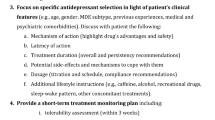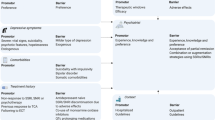Abstract
Little is known about guideline adherence of naturalistic antidepressant drug therapy in outpatients with major depressive disorder (MDD). The aim of the study was to analyze guideline adherence, especially regarding treatment length, treatment evaluation and medication change strategies. We investigated 889 patients with MDD who had been admitted for inpatient treatment and were enrolled in the early medication change trial (ClinicalTrials.gov NCT00974155). We investigated all patients at screening visit regarding previous outpatient drug treatment in the index episode, which was assessed by structured interviews. Demographic variables were obtained from patients and patients’ records. 51.0% of the patients had received previous drug treatment in the index episode, 56.6% were females, and their mean age was 40.0 years. In the 153 patients who were pharmacologically treated at least 8 weeks, medication was not changed in 129 (84.3%) patients. Patients who had a medication change in their index episode (n = 24, 15.7%) waited 71.1 weeks (±110.4) for their treatment optimization. Only 5 of those 153 patients (3.3%) had a dose increase, whereas 132 patients (86.3%) had no dose adaption at all. Antidepressant blood levels were measured in 46 patients (30.1%). We conclude that a large proportion of patients with MDD is not treated in adherence to treatment guidelines recommending treatment evaluation (e.g. therapeutic drug monitoring) and treatment change after 4 to 8 weeks in non-responders. Earlier treatment optimization may prevent long-term suffering of patients and may avoid inpatient treatment.
Similar content being viewed by others
References
Murray CJ, Vos T, Lozano R et al (2012) Disability-adjusted life years (DALYs) for 291 diseases and injuries in 21 regions, 1990–2010: a systematic analysis for the Global Burden of Disease Study 2010. Lancet 380:2197–2223
Sobocki P, Jonsson B, Angst J et al (2006) Cost of depression in Europe. J Mental Health Policy Econ 9:87–98
Wittchen HU, Jacobi F, Rehm J et al (2011) The size and burden of mental disorders and other disorders of the brain in Europe 2010. Eur Neuropsychopharmacol J Eur Coll Neuropsychopharmacol 21:655–679
WHO (2015) Depression fact sheet No 369. World Health Organization. www.who.int/mediacentre/factsheets/fs369/en/. Accessed 16 March 2016
NICE (2016) Depression in adults: recognition and management—NICE guidelines [CG90]. National Institute for Health and Care Excellence. www.nice.org.uk/guidance/cg90. Accessed 14 March 2017
DGPPN (2016) S3-Leitlinie/Nationale VersorgungsLeitlinie Unipolare Depression—Langfassung; 2. Auflage, Version 4. Deutsche Gesellschaft für Psychiatrie und Psychotherapie, Psychosomatik und Nervenheilkunde. http://www.awmf.org/uploads/tx_szleitlinien/nvl-005l_Unipolare_Depression_2016-11.pdf. Accessed 14 March 2017
APA (2010) Practice guidelines for the treatment of patients with major depressive disorder. American Psychiatric Association. www.psychiatryonline.org/pb/assets/raw/sitewide/practice_guidelines/guidelines/mdd.pdf. Accessed 14 March 2017
Akincigil A, Bowblis JR, Levin C et al (2007) Adherence to antidepressant treatment among privately insured patients diagnosed with depression. Med Care 45:363–369
Fernandez A, Haro JM, Codony M et al (2006) Treatment adequacy of anxiety and depressive disorders: primary versus specialised care in Spain. J Affect Disord 96:9–20
Milea D, Guelfucci F, Bent-Ennakhil N et al (2010) Antidepressant monotherapy: a claims database analysis of treatment changes and treatment duration. Clin Ther 32:2057–2072
Radisch J, Buchtemann D, Kastner D et al (2013) A literature- and expert-based analysis of the outpatient treatment of depressive ill people in Germany. Psychiatr Prax 40:252–258
Schneider F, Harter M, Brand S et al (2005) Adherence to guidelines for treatment of depression in in-patients. Br J Psychiatry J Mental Sci 187:462–469
Schneider F, Kratz S, Bermejo I et al (2004) Insufficient depression treatment in outpatient settings. German Med Sci GMS e-J 2:Doc01
Smolders M, Laurant M, Verhaak P et al (2009) Adherence to evidence-based guidelines for depression and anxiety disorders is associated with recording of the diagnosis. Gen Hosp Psychiatry 31:460–469
Wiegand HF, Sievers C, Schillinger M et al (2016) Major depression treatment in Germany-descriptive analysis of health insurance fund routine data and assessment of guideline-adherence. J Affect Disord 189:246–253
Tadic A, Gorbulev S, Dahmen N et al (2010) Rationale and design of the randomised clinical trial comparing early medication change (EMC) strategy with treatment as usual (TAU) in patients with major depressive disorder–the EMC trial. Trials 11:21
Nicod J, Wagner S, Vonberg F et al (2015) The amount of mitochondrial DNA in blood reflects the course of a depressive episode. Biol Psychiatr 80(6):e41–e42
Tadic A, Wachtlin D, Berger M et al (2016) Randomized controlled study of early medication change for non-improvers to antidepressant therapy in major depression—the EMC trial. Eur Neuropsychopharmacol 26(4):705–716
Tadic A, Wagner S, Gorbulev S et al (2011) Peripheral blood and neuropsychological markers for the onset of action of antidepressant drugs in patients with major depressive disorder. BMC Psychiatry 11:16
Sheehan DV, Lecrubier Y, Sheehan KH et al (1998) The Mini-International Neuropsychiatric Interview (M.I.N.I.): the development and validation of a structured diagnostic psychiatric interview for DSM-IV and ICD-10. J Clin Psychiatry 59(Suppl 20):22–33 (quiz 34–57)
APA (2010) Diagnostic and statistical manual of mental disorders (4th ed., text rev.). Washington, DC: American Psychiatric Association
Hamilton M (1960) A rating scale for depression. J Neurol Neurosurg Psychiatry 23:56–62
Rush AJ, Giles DE, Schlesser MA et al (1986) The Inventory for Depressive Symptomatology (IDS): preliminary findings. Psychiatry Res 18:65–87
Wagner S, Helmreich I, Lieb K et al (2011) Standardized rater training for the Hamilton Depression Rating Scale (HAMD(1)(7)) and the Inventory of Depressive Symptoms (IDS(C30)). Psychopathology 44:68–70
Zimmerman M, Martinez JH, Young D et al (2013) Severity classification on the Hamilton Depression Rating Scale. J Affect Disord 150:384–388
Kendrick T (2000) Why can’t GPs follow guidelines on depression? We must question the basis of the guidelines themselves. BMJ 320:200–201
Cipriani A, Furukawa TA, Salanti G et al (2009) Comparative efficacy and acceptability of 12 new-generation antidepressants: a multiple-treatments meta-analysis. Lancet 373:746–758
Bschor T, Baethge C (2010) No evidence for switching the antidepressant: systematic review and meta-analysis of RCTs of a common therapeutic strategy. Acta Psychiatr Scand 121:174–179
Blaschke TF, Osterberg L, Vrijens B et al (2012) Adherence to medications: insights arising from studies on the unreliable link between prescribed and actual drug dosing histories. Annu Rev Pharmacol Toxicol 52:275–301
Osterberg L, Blaschke T (2005) Adherence to medication. New Engl J Med 353:487–497
Acknowledgements
The EMC trial (ClinicalTrials.gov Identifier: NCT00974155) was supported by Grant No. 01KG0906 from the German Federal Ministry for Education and Research (BMBF). The BMBF had no role in trial design, data collection, data analysis, data interpretation, or writing of the report. We are grateful to all patients who contributed to this study and to our clinical study members for their work. This includes especially Stefan Elsner, MD (Hospital for Psychiatry and Psychotherapy, Andernach), Julia Reiff, MD (Hospital for Psychiatry and Psychotherapy, Wiesbaden), Joachim Röschke, MD, PhD (Hospitals for Psychiatry and Psychotherapy, Bad Soden and Kiedrich), Ömür Baskaya, MD, Markus Lorscheider, MD, and Alexander Teml, MD (University Medical Center Mainz, Department of Psychiatry and Psychotherapy). We are also grateful to Armin Szegedi and Rolf Meinert (both formerly affiliated to University Medical Center Mainz), who participated in an early study phase of design development as well as to the members of the Data and Safety Monitoring Board (Walter Lehmacher, Institute for Medical Statistics, Informatics and Epidemiology, University of Cologne; Ulrich Hegerl, Department of Psychiatry and Psychotherapy, University of Leipzig; Ekkehard Haen, Department of Psychiatry and Psychotherapy, University of Regensburg).
Author information
Authors and Affiliations
Corresponding authors
Ethics declarations
All participants gave their written informed consent to participate in the study after a complete and extensive description. All study components were approved by the local ethical committee of the Landesärztekammer Rheinland-Pfalz (study code no: 837.166.09 (6671)) and are compliant with the Code of Ethics of the World Medical Association (Declaration of Helsinki).
Conflict of interest
Dr. Tadic has received consultancy fees from Janssen and Novartis. Prof. Roll has received lecture fees by Boehringer Ingelheim, Lundbeck, and Otsuka. All other authors report no conflict of interest.
Rights and permissions
About this article
Cite this article
Herzog, D.P., Wagner, S., Ruckes, C. et al. Guideline adherence of antidepressant treatment in outpatients with major depressive disorder: a naturalistic study. Eur Arch Psychiatry Clin Neurosci 267, 711–721 (2017). https://doi.org/10.1007/s00406-017-0798-6
Received:
Accepted:
Published:
Issue Date:
DOI: https://doi.org/10.1007/s00406-017-0798-6




